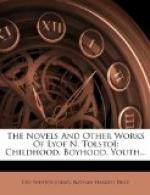Another time, suddenly bethinking me that death might find me at any hour or any minute, I came to the conclusion that man could only be happy by using the present to the full and taking no thought for the future. Indeed, I wondered how people had never found that out before. Acting under the influence of the new idea, I laid my lesson-books aside for two or three days, and, reposing on my bed, gave myself up to novel-reading and the eating of gingerbread-and-honey which I had bought with my last remaining coins.
Again, standing one day before the blackboard and smearing figures on it with honey, I was struck with the thought, “Why is symmetry so agreeable to the eye? What is symmetry? Of course it is an innate sense,” I continued; “yet what is its basis? Perhaps everything in life is symmetry? But no. On the contrary, this is life”—and I drew an oblong figure on the board—“and after life the soul passes to eternity”—here I drew a line from one end of the oblong figure to the edge of the board. “Why should there not be a corresponding line on the other side? If there be an eternity on one side, there must surely be a corresponding one on the other? That means that we have existed in a previous life, but have lost the recollection of it.”
This conclusion—which seemed to me at the time both clear and novel, but the arguments for which it would be difficult for me, at this distance of time, to piece together—pleased me extremely, so I took a piece of paper and tried to write it down. But at the first attempt such a rush of other thoughts came whirling though my brain that I was obliged to jump up and pace the room. At the window, my attention was arrested by a driver harnessing a horse to a water-cart, and at once my mind concentrated itself upon the decision of the question, “Into what animal or human being will the spirit of that horse pass at death?” Just at that moment, Woloda passed through the room, and smiled to see me absorbed in speculative thoughts. His smile at once made me feel that all that I had been thinking about was utter nonsense.
I have related all this as I recollect it in order to show the reader the nature of my cogitations. No philosophical theory attracted me so much as scepticism, which at one period brought me to a state of mind verging upon insanity. I took the fancy into my head that no one nor anything really existed in the world except myself—that objects were not objects at all, but that images of them became manifest only so soon as I turned my attention upon them, and vanished again directly that I ceased to think about them. In short, this idea of mine (that real objects do not exist, but only one’s conception of them) brought me to Schelling’s well-known theory. There were moments when the influence of this idea led me to such vagaries as, for instance, turning sharply round, in the hope that by the suddenness of the movement I should come in contact with the void which I believed to be existing where I myself purported to be!




